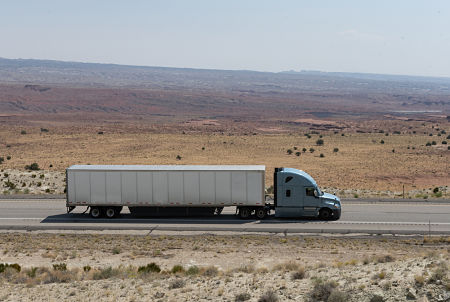Top trucking groups pushing for truck tax relief
Two of the most influential trucking industry lobbying groups in the country, the Owner-Operator Independent Drivers Association (OOIDA) and the American Trucking Associations (ATA) are pushing Congress for a temporary suspension of two truck taxes: the Federal Excise Tax (FET) and the Heavy Vehicle Use Tax (HVUT) to boost the economy during the COVID-19 pandemic.
ATA says suspension of the FET on new trucks and trailers would stimulate increased truck fleet sales.
ATA Chairman Randy Guillot recently told the House Transportation and Infrastructure Committee that truck purchases are down 70 percent during the pandemic.
In July, Rep. Chris Pappas (D-NH) sent a letter to Democratic leaders of the House calling for a suspension of the 12 percent FET on heavy-duty trucks and trailers be included in the next stimulus package. Pappas asked that the tax – which can add $20,000 to the cost of a new truck – be suspended until 2021.
The American Truck Dealers (ATD) are spearheading the Modernize the Truck Fleet Coalition to oppose the FET. The coalition includes 186 industry groups and the UAW. They say the FET is depressing heavy-duty truck and trailer sales and is a roadblock for fleet modernization.
An ATA survey showed that 60 percent of fleets would be more likely to purchase new trucks or trailers if the FET were suspended. ATA says more than half of the Class 8 trucks on the road are more than 10 years old.
Guillot told Congress that a suspension of FET would be a good way to incentivize the trucking industry to upgrade the fleets.
Pappas’ letter was signed by 55 House Democrats and was sent to Speaker Nancy Pelosi.
Heavy Vehicle Use Tax
While ATA is focused on the FET, OOIDA wants relief from the HVUT. OOIDA represents more than 160,000 owner-operators and says Congress should suspend the up to $550 annual fee (based on weight) levied on each commercial truck.
“Truckers are still on the front lines, filling store shelves and supplying hospitals,” said Todd Spencer, president of OOIDA in a statement. “Suspending the HVUT is a way that Congress could easily offer fast, direct relief to all motor carriers. And believe me, they need it, much more than just a ‘thank you.’”
On July 30, OOIDA sent a letter to both House and Senate leadership sharing worries about how the COVID-19 recession has reduced freight rates and created considerable uncertainty for commercial drivers.
OOIDA says suspending the HVUT would have a more immediate benefit to more owners and carriers.
“Congress and the American public have heaped praise on truckers for their work on the front lines of this crisis,” Spencer added. “This action would provide tangible, meaningful help to carriers of all sizes, not just those large enough to have the resources to afford new equipment in the midst of a historic economic downturn.”
Spencer says suspension of the tax would directly benefit independent truckers.
“Offering a one-year suspension of the HVUT is the most direct way that Congress can help every single trucking business,” OOIDA wrote in a letter to Congress. “While some trucking operations have been able to qualify for pandemic assistance through the Paycheck Protection Program or Economic Injury Disaster Loan program, many others have not been able to for one reason or another. Suspending the HVUT would bypass the complications of these programs and provide a simple way to make sure that all truckers get relief.”
Congress created the HVUT in 1982 as a way of charging heavy-duty vehicles for the road damage caused by trucks.
Revenues from the two taxes are significant. In 2019, highway-related excise tax revenue exceeded $40 billion.
U.S. DOT’s most recent Highway Cost Allocation Study estimated that light, single-unit trucks pay 150 percent of their road costs and heavy trucks (more than 100,000 lbs.) pay only 50 percent of their road costs. In total, HVUT taxes raise more than $1 billion per year, which goes to the Federal Highway Trust Fund to address maintenance needs.






